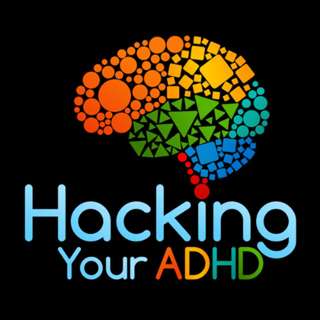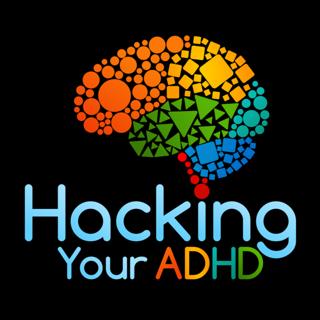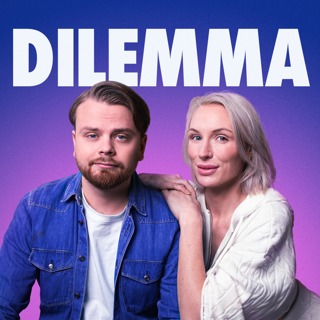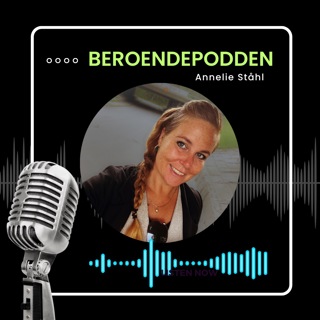
Digital Declutter: Tabs, Tabs, And more Tabs
Did you think I was all done with tabs last week... well I wasn't because there's actually a ton we can still talk about. Tabs are one of those small things in our life that can have a fairly outsized impact. Don't think so? Well, keep listening to find out why. Today we're going to be talking about how tabs can literally change the way our brain works, some ways we can cull having all those tabs open, and then talk a bit about those precursors to tabs... bookmarks. Support me on Patreon Connect with me on: Facebook Twitter Instagram or ask me a question on my Contact Page Find the show note at HackingYourADHD.com/tabstabstabs This Episode’s Top Tips Tabs can serve as an easy way to try to multitask - however, multitasking is just task switching. As we switch from task to task to task we're actually decreasing our overall productivity, not increasing it. Switching tabs can give a hit of dopamine, which only increases our desire to switch tabs more often. We can work on this by being mindful of what kind of tabs we leave open. A great way to limit tabs is to use services like Pocket or Instapaper that allow us to save articles we want to read for later. By storing them in an external system we remove the temptation to just switch to those articles in the middle of other tasks. Another alternative to just leaving tabs open is to use your bookmarks for sites that you either visit frequently or just sites that you know you're going to have to come back to eventually. What we don't want to do however is create bookmarks for sites that we just need to keep open temporarily.
22 Feb 202116min

Digital Declutter: Too Many Tabs
A few weeks ago I asked around on Facebook the number of tabs that my friends had open at the time. Answers I got included: 500 on their phone and 20 on their computer, 50-60 across 5-6 windows, 4-5, 16, 3, 80 across 9 windows, 2, 4, 7, 45, 112 over 17 windows… and of course, at the time of my asking, I had 70 across 12 windows, although as I mentioned earlier I'm down to just a few right now - oftentimes these episodes are just as much about helping me as they are about helping you. Clearly, a lot of people use their browsers in a lot of different ways. Now one thing that was fairly apparent to me is that my more neurodiverse friends tended to be those people who had the most tabs open, although to be clear having too many tabs open isn't just a neurodiverse condition, anyone can easily find themselves overwhelmed by tabs. Today we're going to be looking at why we tend to have so many tabs open and then some of the ways we can work on reducing that number. Support me on Patreon Connect with me on: Facebook Twitter Instagram or ask me a question on my Contact Page Find the show note at HackingYourADHD.com/digitaldeclutter This Episode’s Top Tips We tend to trying and use tabs as an extension of our working memory, but as we open more and more tabs we stretch our mental resources and it can become overwhelming to figure out what we need to take care of. One of the reasons we open so many tabs is that we're afraid of missing something - be it an article to read, a video to watch, or something in your social feed, our brains tell us we want to see it all. Unfortunately, we're never going to see everything so we've got to work on being choosier about what we focus our attention on and be okay missing some things. We can install extensions into our browsers to help limit the number of tabs we have open, or install a tab manager to help us keep better track of everything we have open.
15 Feb 202118min

Decluttering Your Digital Life
We all have an idea of what clutter is - it's just all that stuff. It's that frustrating feeling when you can't find something just because there are too many other things to look through. Clutter is disorder. While we typically see clutter as a physical thing - the junk on our desk. The pile in the corner of the room. The stuff spread out all over our counters - we can also experience its digital counterpart because we also amass a lot of stuff digitally. Today we're going to start our journey of working on our decluttering our digital lives - in this episode, I am going to be focusing on email and the files on our computers - next week we'll be continuing this series with an episode on all those tabs we have open in our browsers. I also considered doing an episode on our phones, but for now, I'm just going to direct you to Episodes 17 & 18, How to Make your Smart Phone ADHD Friendly - although I'm definitely going to have to update those episodes at some point. Support me on Patreon Connect with me on: Facebook Twitter Instagram or ask me a question on my Contact Page Find the show note at HackingYourADHD.com/digitaldeclutter This Episode's Top Tip Digital clutter is just all that stuff that builds upon our devices. It can have a real effect on our mental health and is something to be especially aware of with ADHD because it can create a lot of distractions. To help manage our email we want to work on processing our email only a few times a day and then making sure that when we do that we're not treating our email as a task manager → don't leave things in your email to do later, either put them in a real task manager or deal with them right then. Work on creating actual organization for your files → by keeping your files in places that are logical for your brain to find them you make accessing your files easier when you need them. Back up your files. Seriously, you don't want to lose something you've been working on because your computer crashed. There are a ton of services that make this process easier than ever now.
8 Feb 202118min

Masquerading As Adults
#Adulting Now there's something a lot of us can relate to - or relate to the idea that adulting is something we sometimes do, but being an adult is not something we are. ADHD can make us feel like we're not really adults. An adult would get their bills paid on time. An adult wouldn't let their house get this messy. An adult would be eating healthy meals for dinner every night. Now it would be a stretch to say that I feel like an adult all of the time, but I'm certainly getting there. A big part of the is probably having kids - it can be hard to not feel like the adult when you are literally the adult in the room. Also, there's the whole losing track of what going on with slang - I mean I know what straight fire is and but I still have to look up what a VSCO girl was and I'm only mildly sure I understand what being on fleek means. Although really that's more of a confirmation that I'm old rather than I'm being an adult. Regardless - today we're going to be exploring those feelings of not being an adult and how that interacts with our ADHD. Support me on Patreon Connect with me on: Facebook Twitter Instagram or ask me a question on my Contact Page Find the show note at HackingYourADHD.com/adulting This Episode’s Top Tips No one has everything in their life together all of the time - instead of focusing on what your missing try giving yourself credit for the things you are doing. ADHD can amplify these feelings of not being an adult because we're not neurotypical - there are absolutely things that are going to be harder for us to do, but we can do hard things. To help celebrate everything that you do throughout the day try creating a ta-done list → this is just a list of everything that you do throughout the day, from filling up the dishwasher to making a call to a friend to sending those emails you need to send. It's easy for us to forget what we've actually accomplished in a day and a ta-done list can help remind us that, yeah, we actually did somethings today. At some point all of us find ourselves doubting our ADHD, it's okay - ADHD is a spectrum and you're never going to have all the symptoms that everyone else has. Be reassured that you're not alone in this feeling and that even if you didn't really have ADHD, you're still doing the right things to help your brain.
1 Feb 202118min

The Surprising Magic of Setting a Deadline
When I was in school, I always wanted to be the kind of student who able to finish a project well before it needed to be turned in. I loved the idea that I could write a paper and still have a week left to polish it. Of course, I was never actually that student. For me to get started on a paper, I had to actually be able to feel that pressure from the deadline building up on me. That usually meant that I was mostly working on papers the night before - I'm sure a lot of you can relate. Since I was still able to get good grades with this strategy, I never really changed it - but I always wished that I wasn't always riding by the seat of my pants. Despite having a good track record, there were times that I missed those deadlines. And a funny thing about it was that I always wanted more time to write my papers. In my brain, if the deadline was pushed farther out I would have had more time to start, and yet experience has taught me that it really didn't matter how much time I was given to complete a paper. Given a week or month, I would still procrastinate until the last minute. When those deadlines were moving in on me, I was able to focus like no other. The time pressure allowed me to block out all those other distracting ideas vying for my attention. Today we're going to be exploring how we can use this time pressure to complete those nagging tasks that we otherwise might not get done and also those things we want to do but just can't seem to prioritize. We'll also be looking at better ways to set deadlines so that we can follow through with our intentions. Support me on Patreon Connect with me on: Facebook Twitter Instagram or ask me a question on my Contact Page Find the show note at HackingYourADHD.com/deadlines Today's Top Tips Time pressure from deadlines allows us to focus on the tasks in front of us and distill our work down to the most important parts. When setting deadlines we want to make sure that they are relevant to either us or the project. A great way to do this is through accountability and getting someone else to check in on your progress. Deadlines need to be realistic if we plan on meeting them. Time blindness can make it hard to know how long something is actually going to take, but if we break down our projects into chunks we can work on hitting milestones with mini-deadlines.
25 Jan 202114min

Breaking Down the ONE Thing (rebroadcast)
In this week's episode, I am going to be going over the book The ONE Thing by Gary Keller and Jay Papasan - I was introduced to this book by Eric Tivers through the ADHD reWired Coaching and Accountability groups. I can't remember if it was required reading or just strongly encouraged when I took the groups, but the messages in this book were key to getting through the coaching groups. My first reading of the book was on audiobook and since then I've listened to it three more and read the physical version of the book twice. The subtitle of the book is, "The surprisingly simple truth behind extraordinary results" - and as I've mentioned before, just because something is simple doesn't make it easy. Each reading has helped me understand the concepts a little bit better and I was always able to pick up a few new things. Today I'm going to be going over the "surprisingly simple truth" in the book and discussing how we can better apply it for our ADHD brains. Support me on Patreon Connect with me on: Facebook Twitter Instagram or ask me a question on my Contact Page Find the show note at HackingYourADHD.com/theonething Today's Top Tips Use the focusing question to help you determine your one thing - the focusing question again is: "What's the ONE Thing that you can do such by doing it that everything else is easier or unnecessary?" Change your thinking and value your time by saying "no" more and time blocking time for your ONE Thing You can have a ONE Thing for each of your life domains, but they should all be working toward a common purpose If you liked this episode I'd recommend you check out the book the ONE Thing and read through it on your own - I skimmed a lot of parts for this episode so I'm sure you could get a lot more out of it. You can find a link to the book on the show notes page.
18 Jan 202115min

Among Us
Last year there was a surge in the popularity of the game Among Us - 1000's of people jumped on to be funny little scientists running around there spaceship running various little tasks... all while trying to find out who among them didn't belong - the one who was trying to sabotage the mission. The one who was an imposter. I definitely played my fair share of the game, but always felt like I didn't get to play as the imposter nearly as much as I wanted to... yet in real life, far too often I feel like I'm playing the imposter. I'm sure that many of you can relate to feeling like the only reason you are where you are is that you tricked people into thinking that you belong. Maybe you think that you're not really qualified for your job, or maybe you got into a program that you're sure someone else would have been better qualified for, or maybe you feel like you're friends are just pretending to like you. This is called imposter syndrome and it is shockingly common - I say shockingly common because when you're feeling it, it's hard to imagine anyone else feeling quite like you do - and yet almost everyone feels imposter syndrome to some extent. Support me on Patreon Connect with me on: Facebook Twitter Instagram or ask me a question on my Contact Page Find the show note at HackingYourADHD.com/amongus This Episode’s Top Tips Imposter syndrome is the feeling of self-doubt around your skills, talents, or accomplishments where you fear of being exposed as a "fraud". By understanding what causes imposter syndrome you can begin to work on overcoming it - understanding that it's not just you and that even if we're chalking up all our success to luck that we still had a hand in creating that luck. Talking about and reflecting on our imposter syndrome is a great way to work on overcoming it - when we bottle up those feelings it can be hard to have real perspective on the situation. By acknowledging the feels and removing our beliefs about all or nothing success we can work through those feelings of being an imposter
11 Jan 202117min

On The Razors Edge
Occam's Razor is a philosophical rule (and that's rule in a very soft sense) that we can use to help us with problem solving. In philosophy a razor is a tool used to eliminate (or shave off) options that might lead us astray. Occam's Razor is one of the most popular examples and has made it's way into popular culture from the movie Contact to Sherlock Holmes to The Big Bang Theory. I imagine that a lot of you have heard of the famous razor before, which states that: plurality should not be posited without necessity. Now I'm sure that's perfectly clear for most of you, but for my benefit I'm going to do a bit of unpacking on that phrase, cause plurality should not be posited without necessity seems a bit dense to me. The basic idea here is that when we're looking at competing ideas we want to go with the one that has the fewest assumptions - or that the simplest explanation is often preferable to a complex one. Of course the rule on simplicity also isn't as simply as it seems. Today we're going to be exploring Occam's Razor and also looking at how we can apply it to coming up with better solutions for our ADHD. Support me on Patreon Connect with me on: Facebook Twitter Instagram or ask me a question on my Contact Page Find the show note at HackingYourADHD.com/occamsrazor This Episode's Top Tips Occam's Razor states: plurality should not be posited without necessity - or more simply when we're looking at competing ideas we want to go with the one that has the fewest assumptions - or that the simplest explanation is often preferable to a complex one. With ADHD we can use Occam's Razor to help when we're trying to overcomplicate something - often we go all in on ideas and don't let ourselves see the forest for the trees. While the simplest explanation is often preferable we also have to keep in mind that we have ADHD - what might be a simple solution for a neurotypical might not be a viable solution for us.
4 Jan 202117min






















